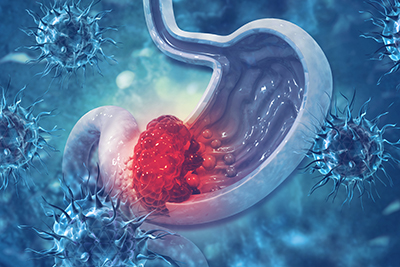By Sarah Glass

Clocking in at two pounds, the stomach is one of the body’s heaviest internal organs and can become afflicted with one of the leading causes of cancer-related death: gastric cancer. While some teams of scientists search for enhanced treatment options, others explore its origins and how it can be prevented. The lab of James Goldenring (Surgery) belongs in the latter group. Led by first author Jimin Min, they report in Gastric Cancer that they have identified a micro RNA as an important player in the transition from normal tissue to precancerous cells in the stomach.
Micro RNAs or miRNAs function by binding to target mRNAs, leading to their degradation and ensuring that no functional protein can be produced. mir-30a is a micro RNA that targets mRNAs of proteins that increase cellular invasion and proliferation, two key hallmarks of cancer. Without regulation by miR-30a, cells could take on malignant characteristics. Since miR-30a is typically missing in advanced gastric cancer stages, the researchers wanted to determine at which point in cancer progression miR-30a is lost and whether it has a role in cancer initiation.
When comparing normal stomach tissue to tissue in the early stages of gastric cancer, the Goldenring lab discovered that the loss of miR-30a was an early event in cancer progression. They injected mice with gastric cancer cells that expressed miR-30a and found that those mice had a lower tumor burden compared to mice that were injected with cells that did not express the miRNA, suggesting that the it had a protective role against excessive tumor growth throughout the advancement of the cancer.
Considering that miR-30a led to a reduced tumor burden, the Goldenring lab concluded that it is a tumor suppressor, likely targeting a potentially cancer-causing protein. Thus, the researchers set out to identify the gastric tissue mRNAs targets of miR-30a. When comparing gastric cancer cell lines that did or didn’t express miR-30a, the investigators detected high mRNA levels for integrin subunit alpha-2, which is involved in cell adhesion, only in the miR-30a-deficient cells.
The researchers observed similar results in human gastric cancer tissue and non-cancerous stomach tissue. Tissue samples from patients with early precancerous lesions showed that integrin alpha-2 was expressed more than in normal gastric tissue. When the researchers artificially reduced integrin alpha-2 expression in a gastric cancer cell line, they noted a decrease in cell invasiveness and proliferation, suggesting that loss of miR-30a increases integrin alpha-2 production and cancerous potential of gastric tissue.
These findings suggest how regulation by a miRNA, miR-30a can suppresses tumorigenicity in stomach cells. Goldenring’s team details an example of how individual molecules can naturally suppress tumors and how an early loss of such a factor could be an initiation point for cancerous progression. Determining how miR-30a is lost is the next step in gastric cancer prevention.